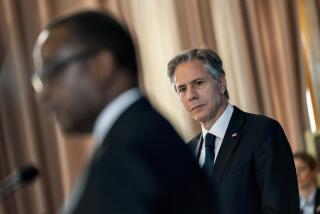Shultz Sees Peace Hopes in Angola Talks
- Share via
WASHINGTON — Secretary of State George P. Shultz has indicated that he opposes any immediate decision to provide covert aid to Angolan rebels in hopes that a delay will spur Angola’s Marxist regime toward a negotiated settlement, State Department officials and congressional sources said Tuesday.
Shultz said a U.S.-Angolan meeting last week offered new hope that the Luanda government of President Jose Eduardo dos Santos, faced with the threat of large-scale American aid to the rebels, will agree to longtime U.S. demands that it send Cuban troops home and negotiate with the insurgents.
“The talks . . . really were useful,” he told reporters who accompanied him on a trip to Colombia earlier this week. “I’d put it in a positive way.”
He said the Reagan Administration backs rebel leader Jonas Savimbi but would prefer to see negotiations rather than an escalation of Angola’s 10-year-long guerrilla struggle, an outgrowth of factional rivalries between Marxist and pro-Western groups that battled the Portuguese for independence.
“We support Savimbi,” Shultz said. “The question is, what’s the most effective way to do it? And if a negotiation can take place that withdraws foreign forces from Angola and Namibia, that gets a Namibian settlement--well, then that’s a good way to support Savimbi.”
The United States has been seeking for five years to negotiate a withdrawal of Cuba’s estimated 25,000 troops from Angola, where they have been propping up the regime, as well as a withdrawal of South Africa’s army from neighboring Namibia (South-West Africa). But the effort has been stymied by resistance in both Angola and South Africa.
Fire From the Right
Shultz’s position has drawn opposition from conservatives in the Administration and Congress, who want to give Savimbi enough military aid to overthrow the Luanda government.
President Reagan told reporters last month that both he and Shultz favor covert aid to Savimbi. But other officials said that Shultz wanted to give the Angolan government a last chance to engage in negotiations before committing the United States to a military role.
“Our policy is to try to find a way to end the violence,” a State Department official said. “We have not backed away from that.”
Assistant Secretary of State Chester A. Crocker traveled to Zambia last week for two days of talks with Angolan Interior Minister Alexandre Rodrigues, the first such contact in five months. Crocker said after the meetings that the United States wants to “re-energize” negotiations, and Rodrigues said the two countries agreed to meet again in Luanda soon.
In Congress, there was skepticism that talks could produce any real concessions from the Angolans.
“Of course we support a negotiated settlement,” said a spokesman for Rep. Claude Pepper (D-Fla.), sponsor of a bill to provide $27 million in open aid to Savimbi. “And if a proposal like ours helps produce a settlement, that’s fine. . . . But there’s no sign yet that anything is coming out of these negotiations.”
Shultz has publicly opposed the idea of above-board military assistance because, aides said, it would become an obstacle to negotiations. But Pepper’s spokesman said the congressman has been assured “that the Administration would, in fact, support his bill in time.”
CIA Aid Was Discontinued
The House Rules Committee turned down a request from several conservatives Tuesday to allow debate on Pepper’s overt aid bill this week.
The CIA secretly aided Savimbi’s army, the National Union for the Total Independence of Angola, until Congress discovered the scheme and cut it off in 1976.
Since then, Savimbi has continued his guerrilla war with support from South Africa and Zaire, controlling as much as one-third of Angola’s territory from his base in the southeast.
Congress repealed its prohibition on aid to Savimbi’s force last summer, soon after its vote in favor of “non-lethal” aid to the Nicaraguan rebels ( contras ) . The CIA and other agencies then prepared proposals for covert assistance, but Reagan made no decision on the issue.
Last month, 101 members of Congress, mostly Democrats, sent a letter to the President urging him not to aid Savimbi.
More to Read
Sign up for Essential California
The most important California stories and recommendations in your inbox every morning.
You may occasionally receive promotional content from the Los Angeles Times.














